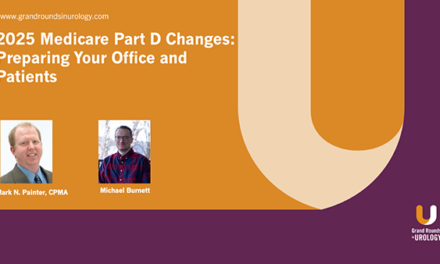Evan Goldfischer, MD, MBA; Alan Winkler, MHSA, FACMPE; and Allison Griffin presented “LUGPA Lecture: Urology Employment Issues” during the 32nd Annual International Prostate Cancer Update (IPCU32) conference on March 8, 2022, in Snowbird, Utah.
How to cite: Goldfischer, Evan R. Griffin, Allison. Winkler, Alan D. “LUGPA Lecture: Urology Employment Issues.” March 8, 2022. Accessed Jul 2025. https://grandroundsinurology.com/lugpa-lecture-urology-employment-issues/
LUGPA Lecture: Urology Employment Issues – Summary
Evan R. Goldfischer, MD, MBA, is a urologist and Director of the Research Department at Premier Medical Group in Poughkeepsie, New York and President-Elect of the Large Urology Group Practice Association (LUGPA). Alan D. Winkler is the Executive Director at Urology San Antonio, P.A. in San Antonio, Texas and a Fellow in the Medical Group Management Association’s American College of Medical Practice Executives (MGMA FACMPE). Allison Griffin is Administrator for Urological Associates of Savannah and the Urology Surgery Center, LLLP in Savannah, Georgia. Together they discuss employment issues in urology. Dr. Goldfischer explains that at LUGPA they believe in a dyad management for urology practices, meaning there is a urologist overseeing the clinical side of the practice and business manager/administrator running the financial side of the practice. He shares workforce statistics showing major demographic shifts (e.g., sixty percent of medical students are female) and emphasizes that, annually, 600 urologists are retiring while only 300 urologists are entering the workforce. Dr. Goldfischer highlights 2020 American Urological Association (AUA) census hiring data and explains that salary guarantees for recruits are becoming more common and salaries are rising with the demand for urologists. With this scenario as a backdrop, he outlines recommendations for a physician succession action plan. Dr. Goldfischer then turns the podium over to Alan Winkler, MHSA, FACMPE, to discuss physician burnout and retention. Mr. Winkler outlines the symptoms of burnout and lists stressors, discussing what he calls the pandemic effect, citing data from the MGMA/Jackson Physician Survey from January 2022 that showed 46 percent considered a change in employer, 43 percent considered early retirement, and 27 percent considered leaving medicine altogether. Mr. Walker posits that a solution lies in combating quality-of-life erosion. He outlines strategies to restore physician autonomy, increase peer interaction, and to assess current physician quality of life. He also recommends that practices use data in every aspect and standardize and synchronize workflows to save physicians time while providing better patient care. Mr. Walker turns to staff recruitment issues and highlights data on how the pandemic caused staffing shortages across the healthcare sector. He cites data from the Physicians Practice Staff Salary Survey 2021 regarding staffing challenges, staff benefits, and salary insights for medical assistants, front desk staff, and billers and coders, before turning the talk over to Allison Griffin who discusses strategies for staff engagement. She suggests planning events and celebrations and using the intranet and other communications channels to post these events, showcase and unite workers, celebrate diversity, elicit feedback, promote contests and drawings, and convey internal information. Finally, Ms. Griffin discusses the importance of creativity and responsiveness to staff interests, emphasizing recognition of exemplary performance (e.g., photos on a wall of fame; discretionary bonuses) as well as celebrating tenure and encouraging continual professional growth.
About the 32nd Annual International Prostate Cancer Update (IPCU32):
Presented by Program Chair E. David Crawford, MD, The International Prostate Cancer Update (IPCU), is a multi-day, CME-accredited conference focused on new developments in prostate cancer treatment, diagnosis, and prevention. IPCU 32 featured lectures, interactive discussions, panel roundtables, debates, and case reports. This conference was led by expert physicians and is designed for urologists, medical oncologists, radiation oncologists, and other healthcare professionals involved in the diagnosis and treatment of prostate cancer.
ABOUT THE AUTHOR
Dr. Goldfischer is a urologist and Director of the Research Department at Premier Medical Group in Poughkeepsie, New York. He received his BA from Tufts University and his MD from Cornell University Medical College. He completed his Internship in General Surgery and his Residency in Urology at the University of Chicago. He then completed a Fellowship in Endourology under the direction of Arthur Smith at Long Island Jewish Medical Center. Dr. Goldfischer received his MBA from the University of Massachusetts and is a Certified Physician Executive. He is the Founder and Chair of the Board of Premier Cares Foundation, which aims to support and educate individuals who are unable to address significant issues like prostate and colon cancer. He has authored more than 100 peer-reviewed abstracts and publications and has lectured on six continents. Dr. Goldfischer has served as the Chair of the Advanced Prostate Cancer Expert Panel for the Public Education Council of the Urology Care Foundation, which is the official foundation of the AUA. He was elected to the LUGPA Board of Directors in 2014 and was elected Secretary of LUGPA in November 2018. Dr. Goldfischer was elected President of LUGPA in 2022 and still serves in that role.




